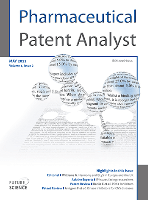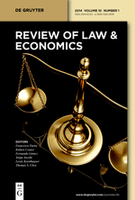
BIOTECHNOLOGY LAW REPORT
Scope & Guideline
Empowering Legal Insights in Biotechnology
Introduction
Aims and Scopes
- Legal Analysis of Biotechnology Innovations:
The journal extensively covers legal interpretations and challenges associated with biotechnology innovations, focusing on patent eligibility, intellectual property rights, and recent court rulings. - Regulatory Frameworks and Compliance:
It discusses the regulatory landscape that governs the biotechnology sector, including FDA regulations, biosafety laws, and international compliance issues, thereby highlighting the importance of legal frameworks in biotechnology development. - Ethical Considerations in Biotechnology:
The journal addresses ethical concerns surrounding genetic modifications, human gene editing, and biobanking, providing a platform for discourse on the moral implications of biotechnological advancements. - Emerging Trends in Biotechnology Law:
It explores emerging legal trends and case law developments in biotechnology, particularly those that influence patent strategies and market access for biopharmaceuticals. - Global Perspectives on Biotechnology Regulation:
The journal offers comparative analyses of biotechnology laws from different countries, emphasizing global regulatory challenges and collaborations in the biotechnology field.
Trending and Emerging
- Artificial Intelligence in Biotechnology:
Recent publications have intensified focus on the implications of artificial intelligence in biotechnology, including its impact on patent law and regulatory practices, reflecting the growing integration of AI in biotech research and development. - Gene Editing and Ethical Issues:
There is a notable increase in discussions surrounding gene editing technologies, particularly CRISPR, and the ethical boundaries associated with their use, underscoring the need for regulatory frameworks that address these advancements. - Global Regulatory Responses to COVID-19:
The journal has seen a surge in articles analyzing global regulatory responses to the COVID-19 pandemic, particularly concerning vaccine patenting, compulsory licensing, and public health implications, demonstrating the urgency of legal adaptations in times of crisis. - Cross-Border Biotechnology Regulation:
Emerging themes include the challenges and legal considerations of cross-border biotechnology regulation, particularly in the context of biobanking and clinical trials, reflecting the globalization of biotechnology research. - Biosimilars and Generic Drug Competition:
There is a growing emphasis on the legal aspects of biosimilars and generic drug competition, particularly in relation to legislative changes aimed at increasing market access and competition within the biotechnology industry.
Declining or Waning
- Traditional Patent Law Discussions:
The frequency of articles dedicated solely to traditional patent law discussions has decreased, as there is a growing emphasis on more complex intersections of patent law with emerging technologies and ethical considerations. - General Industry Updates without Legal Analysis:
There appears to be a decline in publications focused on general updates about the biotechnology industry that lack in-depth legal analysis, suggesting a shift towards more specialized and analytical content. - Historical Case Law Reviews:
The journal has reduced its focus on historical case law reviews, moving towards more contemporary and relevant case discussions that address current biotechnology challenges. - Basic Regulatory Frameworks:
There is a waning interest in basic discussions of regulatory frameworks, with a preference for articles that tackle specific regulatory challenges and innovations in the biotechnology sector.
Similar Journals

International Journal of Law and Information Technology
Exploring Legal Frontiers in the Digital Age.The International Journal of Law and Information Technology, published by Oxford University Press, stands as a leading forum for the exploration of the evolving intersection between law and information technology. With its ISSN 0967-0769 and E-ISSN 1464-3693, this esteemed journal has been at the forefront of academic discourse since its inception in 1993 and is poised to continue influencing the landscape of legal scholarship and information sciences until at least 2024. With a prestigious categorization in the Q2 quartile for both Law and Library and Information Sciences, the journal is prominently ranked in the 76th and 64th percentiles respectively within Scopus rankings. Offering insights on vital themes such as privacy, intellectual property, and technological regulation, the International Journal of Law and Information Technology provides a valuable resource for researchers, practitioners, and students alike, facilitating a deeper understanding of the legal challenges and opportunities presented by technological advancements. While not an open-access publication, the rigorous peer-reviewed articles serve to enrich the global academic community’s knowledge in this critical and dynamic field.

GEORGE WASHINGTON LAW REVIEW
Navigating the Complexities of LawThe George Washington Law Review, ISSN 0016-8076, published by George Washington University, stands as a leading academic journal in the field of law, distinguished by its prestigious Q1 category ranking in Law for 2023. Established as a pivotal platform for legal scholarship, the journal reflects a deep commitment to advancing legal discourse through the publication of rigorous, thought-provoking articles and analyses. The journal's impact is further underscored by its Scopus ranking, placing it in the 72nd percentile within the Social Sciences category for law, showcasing its relevance and influence in legal academia. While not an open-access journal, it contributes significantly to legal research and education, making it invaluable for scholars, practitioners, and students seeking to engage with contemporary legal issues. Its comprehensive coverage since 1976 ensures a wealth of resources dedicated to evolving legal thought and practice, solidifying its role as an essential resource within the legal community.

Air & Space Law
Exploring the Frontiers of Air and Space LawAir & Space Law is a prestigious academic journal published by Kluwer Law International, committed to advancing legal scholarship within the realm of air and space law. Serving as a critical platform for researchers, professionals, and students, this journal explores the intricate legal challenges arising from aviation and space exploration activities. With an ISSN of 0927-3379 and an E-ISSN of 1875-8339, it has established itself in the competitive legal landscape, currently holding a Q2 ranking in the Law category, positioning it within the top half of its field according to the latest Scopus metrics. Although it does not offer open access, the journal remains accessible to a wide audience via institutional subscriptions, disseminating pivotal insights that shape international policy and regulatory frameworks. The converged years from 2018 to 2024 reflect a commitment to evolving discourse, making it an invaluable resource for those engaged in the nuanced intersections of law, technology, and global governance.

Rabels Zeitschrift fur Auslandisches und Internationales Privatrecht
Illuminating the path of comparative law scholarship.Rabels Zeitschrift für Auslandisches und Internationales Privatrecht, published by MOHR SIEBECK, is a premier academic journal dedicated to the field of international and foreign private law. With its esteemed ISSN 0033-7250 and E-ISSN 1868-7059, this journal serves as a vital resource for scholars, practitioners, and students interested in the complexities of cross-border legal issues, comparative law, and the evolution of international legal standards. As a significant contributor to the discourse on private law, the journal facilitates a platform for comprehensive analysis and critical review, ensuring that contemporary legal challenges are addressed through informed scholarly engagement. Although it currently operates under a subscription model, its impact is underscored by its commitment to fostering academic dialogue and advancing legal scholarship. Located in Tübingen, Germany, this journal remains at the forefront of legal research, providing insightful and rigorous contributions to the field.

DUKE LAW JOURNAL
Cultivating diverse perspectives in legal studies.DUKE LAW JOURNAL is a premier scholarly journal published by Duke University, dedicated to advancing the field of law through rigorous research and critical analysis. With an ISSN of 0012-7086 and an E-ISSN of 1939-9111, this distinguished journal has established itself as a vital resource for legal scholars, practitioners, and students alike. As a member of the top quartile (Q1) in Law for 2023 and ranking 267 out of 1025 in the Scopus database, the journal showcases high-impact articles that contribute to the contemporary discourse on legal theory, practice, and reform. While it does not currently offer open access, its rich archive since 1978 provides invaluable insights into significant legal developments in the United States and beyond. The DUKE LAW JOURNAL serves not only as a repository of knowledge but also as a forum for diverse perspectives, making it an essential tool for anyone engaged in the legal profession or academia.

Pharmaceutical Patent Analyst
Transforming Pharmaceutical Research with Patent ExpertisePharmaceutical Patent Analyst, published by Taylor & Francis Ltd, is a premier journal dedicated to the evolving fields of pharmaceutical science and patent law. Established in 2012, this journal provides a rigorous platform for scholarly articles, analytical studies, and insightful reviews that delve into the intersection of drug discovery, pharmaceutical innovation, and intellectual property rights. With a Q2 category ranking in Pharmaceutical Science and Q3 rankings in both Drug Discovery and Medicine (miscellaneous), it is recognized for its impactful contributions to the academic community and industry professionals alike. The journal aims to enhance the understanding of patent strategies, explore emerging pharmaceutical technologies, and foster dialogue on regulatory challenges, ultimately facilitating innovation in drug development. Although it does not currently offer open access, its comprehensive and high-quality content remains essential for researchers, professionals, and students pursuing excellence in pharmaceutical research and patent analysis.

China-EU Law Journal
Exploring the Legal Ties Between China and the EUChina-EU Law Journal, published by SPRINGER HEIDELBERG, serves as a pivotal platform for discourse in the field of international law, particularly focusing on the legal dynamics between China and the European Union. With its ISSN 1868-5153 and E-ISSN 1868-5161, the journal caters to a growing audience interested in understanding the complexities of legal relations, policy frameworks, and regulatory challenges that arise within this crucial geopolitical arena. Although currently not labeled as open access, the journal strives to provide rigorous peer-reviewed articles that contribute significant insights into the evolving legal landscape, making it an essential resource for researchers, practitioners, and students alike. By fostering scholarly dialogue, the China-EU Law Journal aims to enhance the academic community's understanding of cross-cultural legal perspectives, further cementing its role in shaping modern legal thought.

SYDNEY LAW REVIEW
Contributing to Global Legal DiscourseSYDNEY LAW REVIEW is a prestigious academic journal published by the Sydney Law School, dedicated to the field of legal studies and interdisciplinary analysis of law and its impact on society. With its ISSN 0082-0512 and E-ISSN 1444-9528, this journal serves as a vital resource for legal scholars, researchers, and practitioners in Australia and globally. The journal has undergone several phases since its inception in 1990, reflecting the evolving landscape of legal scholarship and policy. Although currently not an open-access publication, it remains a significant contributor to legal discourse, maintaining a Q4 ranking in the Law category as per the 2023 category quartiles. The SYDNEY LAW REVIEW encourages submissions that critically explore contemporary legal issues, thereby fostering a robust platform for academic inquiry and professional advancement.

University of Western Australia Law Review
Illuminating Contemporary and Timeless Legal IssuesThe University of Western Australia Law Review is a prestigious academic journal dedicated to the critical examination and exploration of legal issues in Australia and beyond. Published by the Law School of the University of Western Australia, this journal has become a significant resource for legal scholars, practitioners, and students alike, contributing to the rich discourse in the field of law. With an ISSN of 0042-0328 and a current categorization in the Q3 quartile in the field of Law as per the 2023 rankings, it stands among a cohort of respected legal publications. The journal, though not open access, facilitates a sharing of unique insights and research from 2019 to 2024, aiming to address emerging and traditional legal challenges within a global context. With a Scopus rank of #651 out of 1025 in Social Sciences Law, it holds a percentile of 36, reflecting its valuable contributions to legal scholarship. The University of Western Australia Law Review invites researchers, practitioners, and students to engage with its rich content and to contribute to the ongoing dialogue shaping the future of law.

Review of Law & Economics
Connecting Legal Theory with Economic Practice.Review of Law & Economics, published by WALTER DE GRUYTER GMBH, serves as a pivotal platform in the intersecting realms of law and economics, with its open access policy initiated in 2016 to promote wider dissemination of research. Based in Germany, this journal aims to foster insightful discussions and innovative research that bridge the gap between legal frameworks and economic principles. With an impact factor reflected in its Q2 rank in Law and Q3 rank in Economics, Econometrics and Finance as per the 2023 category quartiles, it positions itself as a significant contributor to scholarly works in both fields. The journal's unique approach highlights a comprehensive analysis of legal issues through an economic lens, making it invaluable for researchers, professionals, and students alike. As it encompasses a broad spectrum of topics from regulatory analysis to market dynamics, the *Review of Law & Economics* continues to be a vital resource for those seeking to enhance their understanding and application of law in economic contexts, with converged years extending from 2005 to 2024.